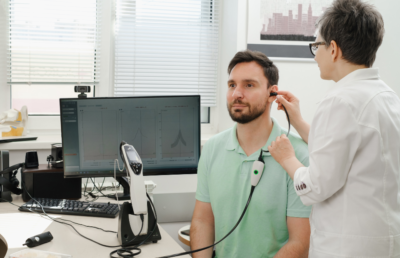Feeling dizzy can be quite unsettling. But did you know that issues like dizziness, vertigo, and balance problems could be related to your hearing?
Here we will explore how hearing loss, dizziness, and poor balance are connected, common symptoms to watch for, and the available treatment options.
The Link Between Hearing Loss, Dizziness, and Falls
Research conducted by the New York Eye and Ear Infirmary of Mount Sinai (NYEE) and published in a 2020 issue of JAMA Otolaryngology-Head & Neck Surgery uncovered a relationship between hearing loss and fall risks.
In an extensive review of previous studies exploring the relationship between sound and standing balance, researchers uncovered that people experienced more difficulty staying balanced or standing still on an uneven surface when it was quiet. In fact, their balance improved when listening to sounds, specifically static background noise.
The researchers believe that this indicates that sound acts as an “anchor,” helping people unconsciously create a mental image of the environment around them to remain grounded.
The analysis also revealed that individuals with vision loss, hearing loss, or balance problems experienced improved posture when hearing stationary sounds.
Senior author Maura Cosetti, MD and Director of the Ear Institute at NYEE, said, “This research suggests that sounds can have a stabilizing effect on balance — maybe acting as an anchor that patients can lean on when other senses are less reliable — and shows that being unable to hear sounds resulted in poorer balance. Ultimately an inability to hear puts patients at higher risk for instability and falls.”
Dizziness is a common symptom of many conditions, often described as confusion, disorientation, unsteadiness, or a whirling sensation.
Most forms of dizziness are caused by conditions related to the ear.
The inner ear contains two chambers, the cochlea for hearing, and the vestibule for balance. The nerve endings in both of these chambers are suspended in fluid and when the fluid moves, signals are sent to the brain. Changes in pressure or circulation of the fluid can result in dizziness.
Common conditions that can cause dizziness include viral inner ear infections, poor blood circulation, head trauma, tumors, Meniere’s disease, and inflammation in the inner ear.
Central dizziness, which occurs when the brain cannot properly interpret the nerve impulses it is receiving, is often experienced by individuals with hearing loss. It is often described as feeling drunk or extremely tired. Some report feeling pressure in the head and others experience a spinning sensation or vertigo.
Age-Related Balance and Hearing Loss
Older adults may experience increased difficulty with balance.
As we age, the walls of our blood vessels thicken, decreasing blood flow to the inner ear, and impacting fluid levels and nerve signals.
When you add this factor to the increased risk of presbycusis (age-related hearing loss) and sensorineural hearing loss (SNHL), the fall risks for older adults are compounded.
Symptoms of Dizziness Due to Hearing Loss
The symptoms and experience of dizziness can vary from person to person, depending on the level of hearing loss or the specific disruptions to the inner ear.
The dizziness can come and go or it can be more constant.
Your dizziness may be connected to your inner ear if you experience one or more of the following:
- Loss of balance and unsteadiness
- Lightheadedness
- Lack of coordination
- Nausea and vomiting
- Disorientation following a change of position
- Whirling or spinning sensation (vertigo)
Diagnosis and Treatment of Dizziness Due to Hearing Loss
Neurologists, ENT physicians and audiologists can work closely together to determine diagnosis and treatment. Dizziness can be caused by many different conditions which means that diagnosis requires thorough evaluation.
Typically, the process will begin by ruling out life-threatening conditions. It will then move to a series of tests to uncover the source of the problem. Audiologists will then perform a hearing test and other specialized balance evaluations to find a cause. This can include a full physical exam, x-rays, blood tests, eye and ear exams, balance tests, and hearing tests.
Dizziness is often treated by medication, rehabilitation, and/or surgery. In some cases, there is no cure, only management.
Anti-nausea drugs may also be prescribed to alleviate some of the more unpleasant symptoms of dizziness. However, this should be only a short-term solution until more thorough testing can be performed. In many instances when doing the specialized balance evaluations, anti-dizziness medications may need to be temporarily stopped.
Vestibular rehabilitation is one of the more successful strategies for treating dizziness. This rehab involves individuals performing transitional movements, like going from sitting to standing, followed by an evaluation to see which motions aggravate the symptoms most. The individual will then be given a series of exercises that evoke and control dizziness. However, this should not be started without having a thorough diagnosis to determine the cause and point of injury.
Address Your Dizziness with a Hearing Evaluation
The first step to relieving dizziness, is to see an audiologist who can guide you to the right place. This can help you determine potential causes and seek proper treatments.
At Chicago Hearing Services, our friendly and experienced staff can help you get to the root of the problem and regain your sense of normalcy. Contact us today to book your hearing evaluation.
For balance evaluations, schedule an appointment at our sister location, Northwest Speech and Hearing Center.





